Genres in music are pointless. That is, if you like something, you should like it no matter what someone else is dubbing it. But I am a musiophile for sure, and hence am obsessed with categorizing and then placing value judgements, all the while knowing the vapidity of it. What can I say, I'm sick. And speaking of sick, I can remember a time, a short month in the winter of 2001, when Madison Drive went emo. That's right, me, Billy Frolic, Bobby Campbell, Brendan Huffman, and even your man Karl Dettbarn embraced that bittersweetness, that fad. We would get up and skip school, wake and bake and listen to all the hottest new emo acts coming off Limewire and Napster. I can't speak for my compatriots, but I heft a bit of blame for my acceptance on booze and an enhanced sense of romanticism, re: virgin hunting. (See, since then I have been deprogrammed, reprogrammed, and deprogrammed again, now and forever basking in the organic minimalism of Johnny Ramone and Handome Dick Manitoba, so I am a crass bore with a refined intelligence. Complex.) Hot bands at the time included: Jimmy Eat World, Alkaline Trio, Hot Water Music, Dashboard Confessional, Modest Mouse, Hey Mercedes and others we didn't partake in like the Get Up Kids and the Promise Ring, who were to pussy for even the most forgiving, if conflicted, punk rocker. At the same time we listened to garage-revivalists like the White Stripes and the Hives, all of whom provided alot of what we love about punk rock, but those emo bands gave us a bit more: unashamed schmaltz.
Emo did not start as emo. First their was emo-core, derived from primarily D.C. hardcore bands who wanted to break the rigid rules of hardcore music. Minor Threat fans started the Rites of Spring (the "the" is and editorial dis, emo-core bands are never "the" bands due to their sickening post-modernity), which was a harcore band that opened their minds to melodic guitar work, varied rhythms, and the key note: deeply personal, highly passionate, emotion driven lyrics, emotions other than anger. With them began that now emo-classic happening of performers and/or audience members crying during songs, they are so overcome by the pure raw emotion. So, in 1985, that music was dubbed emo-core. Just as no Ramone wanted to play "punk rock", Rites of Spring, Ian MacKaye and their contemporaries dispised the emo-core label, but that was what they were playing, so says history.
From this unsuspecting seed/scene, the emo-core style spread across America's Underground throughout the eighties, proportedley acting as a bridge between the sometimes mindless harcore that preceeded it and the new "adult" emotions that it's participants would inescapably feel, such as: "It was better when we were young and dumb, and now we're somewhat sad about the loss of innocence but, hey, let's sing about it." What came out of these feelings was that new and even more intense realationship between bands and audience, all in it together. By the time the nineties rolled in, the underground sorta started to filter out and the "core" dropped off with new bands such as Jawbreaker and Sunny Day Real Estate recontextualizing the genre and nomenclature, and modern "emo" was born, that is, the huge agressiveness of hardcore, the songwriting of pop punk, and the whiny, tortured attutude of emo-core. When these two bands had run their course, the blueprint for a million bands who would actually want to be called emo was laid, and the sterotypes began to take shape, that is referring to a specific type of emotionally overbearing music that was romantic but distanced from the political nature of punk rock, along with the nerd-chic emo fashion. But these bands didn't take with America's youth as a whole, and the U.S.A. went pop punk as opposed to emo, so the emo movement took its lessons and its stereotypes and went back underground, for awhile.
As this new national subculture drew inspiration from bands like Jawbreaker, Drive Like Jehu, Fugazi, and Sunny Day, the new sound of emo developed into a mixture of hardcore's passion and indie rock's intelligence, bearing the anthemic power of punk rock and its do-it-yourself work ethic but with smoother songs, sloppier melodies, and yearning vocals. So Jimmy Eat World, Braid, Mineral, the Get Up Kids and the Promise Ring all did their thing, never threatening to encroach upon the turn tables of us dyed-in-the-wool pop punkers, whose Screeching Weasel, the Queers, the Vindictives, and the Mr. T Experience not only made those emo bands look like boring, no fun havin', mysoginist wussies, but also held the moral highground of being derived directly from the Ramones, the Platonic Form of what you oughtta do if you got a band. Then the unthinkable happened and the first true punk rock/emo crossover record come out.
Out of East Brunswick, NJ, everybody knows Lifetime. Beloved by punkers and supposedly an emo band, it was this blurring of the line that spawned the worst so-called emo-punk the nineties and new millenium would be unfortunate enough to experience, mostly out of Northern Jersey and Long Island, such as Brand New, the Movielife, My Chemical Romance, Taking Back Sunday, Senses Fail, and Thursday, none of whom are punk rock, but weren't exactly called emo on 93.7 WSTW. This was the beginning of the end, the watering down that would lead people to somehow believe that it had to do with anything more than music and fashion. So one primordial emo sound is that of Lifetime, super-fast hardcore-style delivery on thoughtful personal lyrics and big major chords. Another is the Promise Ring, soft and sweet, no balls and don't turn up to loud or you won't hear the singer's adorable lisp, "like getting hit on the head with cotton candy." And then Mineral, somber, dissonent and boring. Of their tune "If I Could", emo-expert Andy Greenwald said, "the ultimate expression of mid-nineties emo. The song's short synopsis—she is beautiful, I am weak, dumb, and shy; I am alone but am surprisingly poetic when left alone—sums up everything that emo's adherents admired and its detractors detested."
What emo's appeal is/was and what ended up getting it on the charts was the old idea of the "lovable loser." Lot's of people don't feel to good about themselves, and so for them hearing Bo Diddley sing that he is 500% Man didn't make any sense, because they don't feel like they are even 10% man, as evidenced in the emo tendency to wear tight jeans that are cut for a woman's body. I mean, I LOVE wearing tight jeans which accentuate my male feature, so I buy them in the men's section of the South Street vintage store, for I am very cool. What I'm saying is that none of these band's singers are exactly Mick Jaggers and have given up trying. Now I AM Mick Jagger (cerca '65) and like Spider Man, I NEVER give up, so it is not the common man mentality but the ultimate realatability of being in a band in the late nineties and everbody trying to make their own great music without remaking "Love Songs For the Retarded" and some came out better than others. Greenwald highlights the positive, "the pinnacle of its generation of emo: a convergence of pop and punk, of resignation and celebration, of the lure of girlfriends and the pull of friends, bandmates, and the road." He refers to mid-1990s emo as "the last subculture made of vinyl and paper instead of plastic and megabytes." It hurts being on the cusp, unless you don't realize you're there. Or maybe it just hurts remembering when you were cusping and you could still see both sides, before you fell to the inevitable side you're on now. See how emo I am?
But who are we kidding, really? The reason emo broke was that Jimmy Eat World made hands down the poppiest emo record imaginable (followed closely by Saves the Day's "Stay What You Are") with a bonafide pop single. "Bleed American" dropped in the summer of 2001, the exact perfect time, if you catch my drift. Osama bin Laden and George Bush decided, not in conjunction with each other, but because of one another, to take America back down to Year One, and we were all gonna shape ourselves all over again and it was gonna be harder this time becasue all the mirrors are now two-way. And everything you learned about punk rock is at the end of a treasure map written in a now dead language, and let's just say that Joel Tannenbaum ain't gonna help where you're going, young sir. It didn't take me more than a half decade to get out of this Chapel Perilous (with a little help from Daniel Desario), and I think you could ask Bobby Campbell and he'd tell you: Every move a right one. No mistakes, no regrets, cause the best times of my life haven't happened yet. You might listen to "Bleed American" and hate its guts, but put on "A Praise Chorus" and I genuinely smell Autumn nights on campus and feel the crisp air, and the Doctrine of Infinite Possibilities, exponential potential, revolution and romance. And isn't it lovely that two chapters have already been written about you, and isn't it just sublime to be in a new chapter, all together like this? And two times percentage is proof, with little hallucinagenic goldfish swimming electric in the back of your skull, and every day you wake up you might be the real and actual Archie with a Betty and a Veronica and even a fucking JUGHEAD, so no way could you ever be more scared than excited to stand with your toes over the edge looking out into the starry black and did Dashboard Confessional really glamourize heartbreak any more than Dr. Frank?
Emo is a tricky animal, you can listen to it and not even know you're doing it. Some Lifetime sounds like the Gorilla Bisuits but poppier. Some Jimmy Eat World sounds like the Pointed Sticks. It came to describe more than it was, even including pop punk that veered even slightly from the so-called norm. The "emo" songs that I like are linked by the feeling of striving for sentimentality of the moment you are experiencing, and frankly that is something that I am interested in, and it takes a lot of energy, and it takes suspension of disbelief, and you might have to tell yourself stories about yourself which you may realize are impermanent and illusional, and maybe that'll help or hurt you, but I crave personal positive drama, I want to be interested, I want to be happy. Like maybe their exists a recharge, a daily wipe-clean where you could be shocked into action, trigger worded and not everything about you changes but you remember something gloriously essential. All I want is constant euphoria. Is that so much to ask?
Claudia Boulton
7 years ago


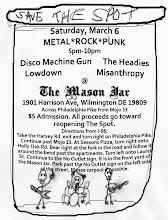

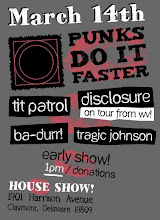
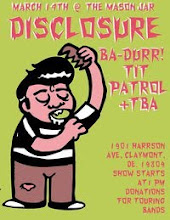
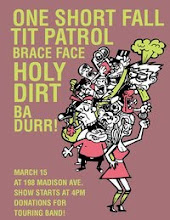

















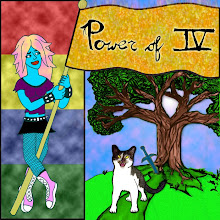










































































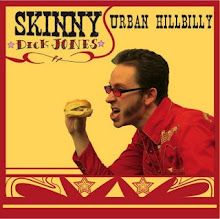




No comments:
Post a Comment